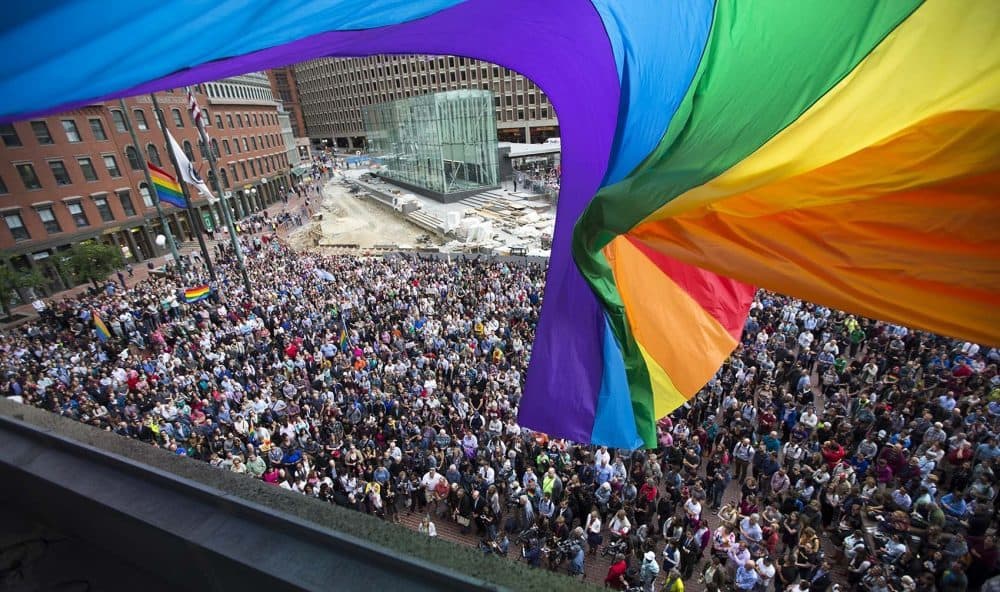Advertisement
Our National Venn Diagram: Pushing Back On America's Polarization

We’ve seen mass shootings. We’ve seen terror attacks. We’ve seen hate crimes. Orlando is all of these: one giant Venn Diagram of woe. It’s amazing how many major themes of politics and culture are at play, how many agendas intersect.
But a tragedy can be an opportunity. In the heat of crisis, people come together. They embrace. They give blood. They hold vigils. They talk. They behave in character, and out of character: In between making racist statements about Muslims this week, Donald Trump managed to voice the most full-throated embrace of the LGBT community that we’ve heard from a Republican presidential candidate. It’s hard to know whom he swayed with either argument.
We’ve seen mass shootings. We’ve seen terror attacks. We’ve seen hate crimes. Orlando is all of these: one giant Venn Diagram of woe.
It's also hard, in this age of Trump, to imagine much good coming from the swirl of rhetoric. But this is the moment to find common ground -- and there’s plenty of opportunity, ample space in the intersecting center of our national Venn Diagram. So in the interest of solidarity, a backlash to polarization, an end to the gridlock that has eroded Americans’ confidence in their leaders, here is a proposed, bipartisan shortlist of things we should be able to agree on, post-Orlando:
1) We don’t know everything about the shooter’s motives. We probably never will.
2) If Omar Mateen was determined to cause mayhem, and he hadn’t had access to a gun, he might well have found another weapon.
3) If he was disturbed and hell-bent on destruction, and if ISIS hadn’t been pitching a message and program, he might well have found another cause. (Indeed, Mateen reportedly claimed to be a member of Hezbollah, a Shiite militia that is an ideological opponent of the so-called Islamic State.)
4) What happened in Orlando isn’t just about terror. It isn’t just about access to guns. But as a society, we need to address both.
5) We have a Second Amendment and large group of law-abiding citizens who have the desire, and the right, to own guns for recreation and self-defense.
6) That right doesn’t extend to every kind of gun. You can’t order an armored tank or a rocket grenade on Amazon. No one should be able to walk into a retail store or gun show and purchase a military-style weapon with this kind of mass killing capacity.
Advertisement
7) Most gun owners are supportive of reasonable restrictions.
8) Prior laws have lacked a clear, clean definition of an “assault weapon.” But someone ought to be able to come up with one.
9) Nearly every religion has radical elements. The existence of Westboro Baptist Church hasn’t shaken global trust in Christianity.
10) Islam is a major world religion, the sincere faith of billions, the vast majority of them peaceful.
11) That last point should not have to be repeated as many times as it has been.
12) Using the term “radical Islam” to refer to a particular, warped interpretation of Islam does not, in itself, taint the religion. Parse the words if you want, but it’s OK to name a threat (so long as you acknowledge point 10).
13) Closing off the borders to a single faith is technically impossible.
14) Closing off the borders to a single faith would not stop an American citizen like Omar Mateen from committing a horrible crime.
If nothing changes, if nobody budges, all of this will happen again.
15) Freedom of expression is one of the great American achievements. If anything makes us exceptional, that’s it.
16) Freedom of expression does not extend to the right to use a social media platform. Social media companies have an obligation to think hard about the conversations they host, the ideologies they enable, the behaviors they implicitly accept.
17) Religious leaders of all faiths and denominations need to think long and hard about what it means to demonize the LGBT community, or any single group of people. It's too easy to use religion as cover for hate.
18) If nothing changes, if nobody budges, all of this will happen again.